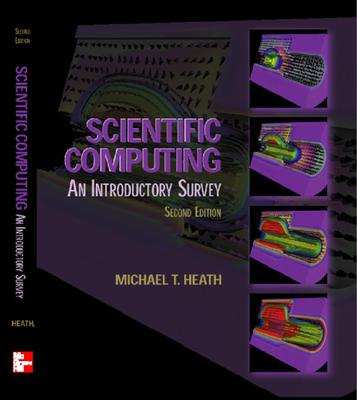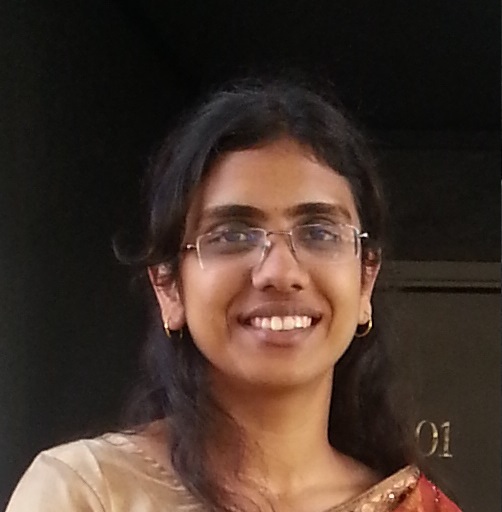
Numerical Analysis (CS 450)
| What | Value |
|---|---|
| Class Time/Location | MWF 9:00am-9:50am / 1310 DCL |
| Class Webpage | http://bit.ly/cs450-s14 |
| Web forum | Piazza |
| Homework submission/grades | UIUC Moodle |
Team
| What | Role | Value |
|---|---|---|
 |
Instructor | Andreas Kloeckner |
| andreask@illinois.edu | ||
| Office | 4318 Siebel | |
| Office Hours | Mondays and Wednesdays 10:00 am to 11:00 am (after class) | |
 |
TA | Kaushik Kalyanaraman |
| kalyana1@illinois.edu | ||
| Office | 0207 Siebel | |
| Office Hours | Mondays 12:45 pm to 1:45 pm; Wednesdays 3:00 pm to 4:00 pm | |
 |
TA | Sweta Seethamraju |
| seetham2@illinois.edu | ||
| Office | 0207 Siebel | |
| Office Hours | Mondays and Tuesdays 2:00 pm to 3:00 pm |
Textbook/Material
- Scientific Computing: An Introductory Survey by Michael T. Heath. Second Edition. Published by McGraw-Hill.
- Resource site for the book
- Jonathan Richard Shewchuk. An Introduction to the Conjugate Gradient Method Without the Agonizing Pain, August 1994.
Updates/Calendar
January 22, 2014 (Wedensday) : Class starts at 9am. See you then, bright and early!
Class Material
- Notes (Chapter 4-end, public, uploaded after each class)
- Full Slides (Chapter 1-12, public, from book resource site)
- Class Slides (Chapter 1-4. Password-protected because of the use of copyrighted slides by Heath, user name and password will be/were announced in class on Jan 24.)
- Code (public)
- Worksheets (public)
- Worksheet solutions (private, same password as slides)
- Practice exam for midterm 1 (private, same password as slides)
- Study guide for the final (private, same password as slides)
- Class recordings (no promises about quality or usability)
Homework
- Homework set 1 (Due: February 12, 2014 · Out: January 29, 2014)
- Homework set 2 (Due: February 26, 2014 · Out: February 13, 2014) Data file 'Price_of_Gasoline.txt'
- Homework set 3 (Due: March 12, 2014 · Out: February 27, 2014)
- Homework set 4 (Due: April
24, 2014 · Out: March 13, 2014) - Homework set 5 (Due: April
1821, 2014 · Out: April 6, 2014) - Homework set 6 (Due: May 7, 2014 · Out: April 24, 2014)
- Project for 4 credit hours (Grad students only · Due: May
1416, 2014 · Progress report due: April1621, 2014 · Out: March 18, 2014) Project starter kit Homework solutions (private, same password as slides)
Schedule
| Date | Chapter | Topic |
|---|---|---|
| W | Jan 22 | 1: Intro |
| F | Jan 24 | Fw/bw error, conditioning, intro floating point |
| M | Jan 27 | Floating point |
| W | Jan 29 | 2: System of Linear Equations |
| F | Jan 31 | LA conditioning, Intro Gaussian el. |
| M | Feb 3 | Gaussian el, preconditioning, pivoting |
| W | Feb 5 | LA cost, Sherman-Morrison |
| F | Feb 7 | 3: Linear least squares |
| M | Feb 10 | Normal equations |
| W | Feb 12 | QR, QR via Gram-Schmidt |
| F | Feb 14 | Householder, Givens, Rank-deficiency |
| M | Feb 17 | 4: Eigenvalues and singular values |
| W | Feb 19 | Transforms, Schur form, Power iteration |
| F | Feb 21 | Rayleigh quotient it, Intro QR it. |
| M | Feb 24 | QR iteration |
| W | Feb 26 | 5: Nonlinear equations |
| F | Feb 28 | Contractive mappings, convergence rates, sensitivity of root finding |
| M | Mar 3 | Stopping criteria, Bisection, Fixed point iteration, Newton |
| W | Mar 5 | Exam 1 Chapters 1-4, in-class. |
| F | Mar 7 | 6: Optimization |
| M | Mar 10 | Existence/uniqueness of minimizers, sensitivity of opt. |
| W | Mar 12 | Discussion of exam 1, Golden Section Search, Newton for Optimization |
| F | Mar 14 | No class Engineering Open House |
| M | Mar 17 | 6: Optimiziation |
| W | Mar 19 | Gauss-Newton, Levenberg-Marquardt, Constrained opt |
| F | Mar 21 | 7: Interpolation |
| M | Mar 24 | No class Spring Break |
| W | Mar 26 | |
| F | Mar 28 | |
| M | Mar 31 | 7: Interpolation |
| W | Apr 2 | 8: Numerical Integration and Differentiation |
| F | Apr 4 | Newton-Cotes, accuracy and stability of quadrature |
| M | Apr 7 | Composite and Gaussian quadrature |
| W | Apr 9 | 9: Initial Value Problems for ODEs |
| F | Apr 11 | IVP terminology, stability, examples |
| M | Apr 14 | Euler's method, accuracy, stability |
| W | Apr 16 | Exam 2 Chapters 5-8, in-class. |
| F | Apr 18 | 9: Initial Value Problems for ODEs |
| M | Apr 21 | Stiff problems, Predictor-Corrector |
| W | Apr 23 | 10: Boundary Value Problems for ODEs |
| F | Apr 25 | Intro BVPs, Existence, Uniqueness, Conditioning, Shooting Method |
| M | Apr 28 | 11: Partial Differential Equations |
| W | Apr 30 | FEM/Galerkin, sparse linear algebra |
| F | May 2 | Stationary methods, Jacobi, Gauss-Seidel, SOR, Conjugate Gradients |
| M | May 5 | PDEs: consistency, stability, time integration |
| W | May 7 | Review |
| W | May 14 | Final exam at 1:30-4:30 PM |
Grading
| What | Value |
|---|---|
| Homework/Quizzes | 30% |
| Exam #1 | 20 % |
| Exam #2 | 20 % |
| Final Exam | 30 % |
Probable grading scale:
| Grade | graduate | undergraduate |
|---|---|---|
| A | [90, 100) | [85, 100) |
| B | [80, 90) | [72, 85) |
| C | [70, 80) | [60, 72) |
| D | [60, 70) | [50, 60) |
- Late Work policy: Work submitted after the deadline will count for half of its original worth. This offer is good for up to one week after the original deadline. After that, no late work will be accepted. [Added to clarify on 2/13] You get exactly one submission per homework set. In particular, this means that:
- No regrading of work already graded. If, between the posted solution and your graded work, you still have questions, feel free to raise those on Piazza or during the TA's office hours.
-
We do not accept partial submissions unless you have a very good reason. (e.g. we won't let you submit problem 1 and 2 before and 3,4,5 after the deadline.) If you modify your submission after the deadline but before it's graded, your entire submission will be counted as late. In addition, the grading policy is set up so that you can mess up on the homework quite badly without a drastic impact on your grade. The homework is intended as a learning experience, so making mistakes is OK. [End addition]
-
Make-up exam policy: Make-up exams must be requested at least one week before the original or make-up date, whichever is sooner.
- Taking the class for 4 credits: Grad students may take CS450 for four credit hours. To this end, an individual project will be assigned around the beginning of March. An initial draft of the report on the project will be due on April 16. The final version of the report (along with all further deliverables, such as code) is due on the day of the final, May 14. The project will count as an extra homework set with double weight.
- Please let me (Andreas) know as soon as you can if you need special accommodations (extra time etc.) on exams. Thanks!
Computing
We will be using Python with the libraries numpy, scipy and matplotlib for in-class work and assignments. No other languages are permitted. Python has a very gentle learning curve, so you should feel at home even if you've never done any work in Python.
Virtual Machine Image
See ComputeVirtualMachineImages to obtain a virtual machine image that you can use to follow the computational exercises in the class and do your homework.
Previous editions of this class
Python Help
Numpy Help
- The SciPy lectures
- The Numpy MedKit by Stéfan van der Walt
- The Numpy User Guide by Travis Oliphant
- Numpy/Scipy documentation
- More in this reddit thread
- Spyder (a Python IDE, like Matlab) is installed in the virtual machine. (Applications Menu > Development > Spyder)
- An introduction to Numpy and SciPy
- 100 Numpy exercises